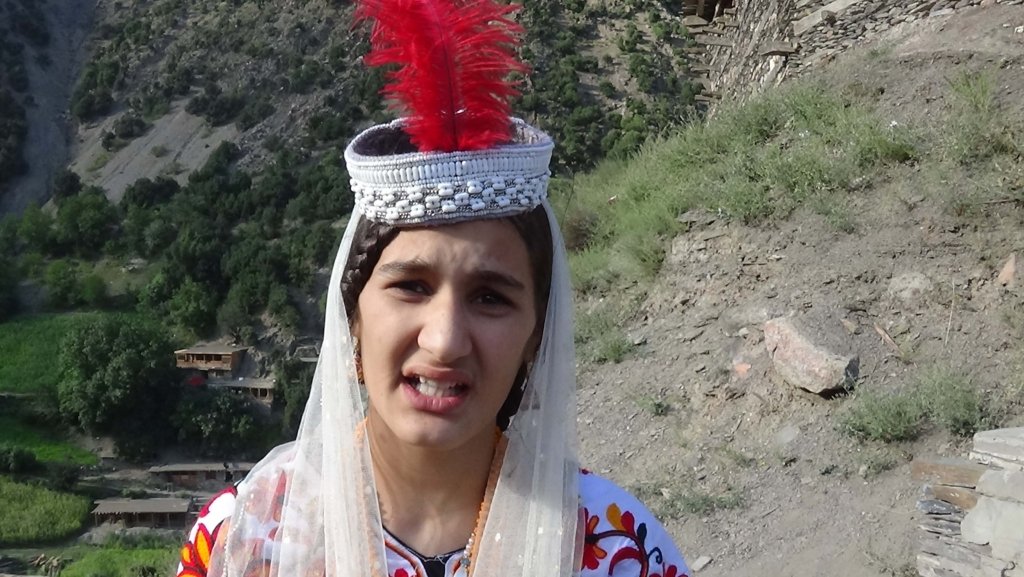
Young people select their future life partner; tourists complain about dilapidated roads, lack of facilities in Kalash valley
By Karimullah & Gul Hammad Farooqi
CHITRAL: The three-day Uchawo festival concluded at Bumburet here on Thursday amid great fanfare, dances, music, prayers and pledges for spending life together by young couples at Bumburet, Kalash valley of Chitral District.
The festival is celebrated to mark the harvesting season. It begins with prayers at a high plateau outside the village in Balangkuru to pay homage to the nature and the Creator for blessing them with good crops and fruits before the night-long dances and singing.
Public representatives, district administration officials including MPA Wazirzada Kalash, DC Alamgir Khan and others also attended the festival. Local people presented them with traditional chogha (woolen coat) and cloak.
A great number of foreign and domestic tourists had thronged the valley to enjoy the festival along with local people in the natural unspoiled environs and secluded valley.
However, most of the tourists complained about the dilapidated condition of roads and lack of facilities in the valley.

They asked the KP government to improve road and communication system and ensure better facilities in the valley to attract more tourists
Wazirzada Kalash, a local MPA of ruling party, admitted that the dilapidated roads were major obstacles in promotion of tourism in the valley.
“Obtaining NOC for tourists to visit Kalash Valley was another hurdle which has now been removed,” he said. He promised to take up the road issue with the relevant authorities to improve road network on priority in the valley.
The MPA also spoke about the history and the significance of the festival. He said we pray for the blessings of the Creator and the good harvest.
About the minorities’ issues, he said “we are thankful to the Muslim community for the affection and love for the minorities.” We are safe and practice our rituals freely as compared to India where minorities are intimidated and harassed, he noted.
“We celebrate the festival to celebrate happiness, share our joys with others, offer prayers for good harvest, peace and prosperity,” Armina, a Kalsha girl, told The High Asia Herald.
“It gives us a sense of collectiveness, togetherness and ownership of the nature,” she added
Charlotte Haphinsen, a British tourist, who was impressed by the celebrations, said she enjoyed the festival a lot. She called for preservation and promotion of the Uchawo and other Kalasha festivals as well as rituals of the community from extinction.
Tourists from all over the world come to Pakistan because of such festivals, she noted.
The festival started on August 20 amid great applause of tourists who not only enjoyed the cultural and religious rites moved from Rumbur to other villages –Bumburet, Anish, Broon Karakul, Birir — in Kalash valley but also visited the historic museum in Bamburet.
On the first day, the young boys and girls attire in their unique colourful dresses and headwear gathered at the community hall in Rumbur. The boys beat the drum with rhythmic chants. Women and girls in their traditional black robes, ornate cowries shelled headwears with coloured necklaces danced in a circle. Young couples select their future life partner and make pledges to remain committed to each other.

 Fresh cheese, milk products were distributed among the foreign and domestic guests to celebrate the festival.
Fresh cheese, milk products were distributed among the foreign and domestic guests to celebrate the festival.
Houses were decorated with different motifs and shapes of animals.
Uchal is one of the important cultural festivals celebrated by the Kalash community to mark the harvesting season of barley and wheat in second week of August.
An important aspect of the festival is visit to the grieving families who have lost a member. People collect flowers and offer to the grieving family members to end their mourning and join the celebrations.
Kalashas do not mourn the deaths. They instead of burying the corpses in grave, keep them in wooden caskets above the ground.
Before Uchal, the Kalash community also performs Ranat dance in July to celebrate the pre-harvest ritual with cheese, corn, and wine. Music and dance are the integral part of the Kalasha people.
Kalash Valley
Over 4,000 Kalasha indigenous people live in Bumburet, Rumbur, Acholgah, Birir and other villages in Kalash Valley.
The members of the unique but endangered Dardic pagan tribe speak Kalasha language, a branch of the Indo-Iranian languages.
The Nuristani people of the adjacent Nuristan province of Afghanistan once practiced the same rituals and religion as the Kalash. By the late 19th century much of Nuristan had been converted to Islam, but they continue to practice their ancient customs and rituals.

The High Asia Herald is a member of High Asia Media Group — a window to High Asia and Central Asia




